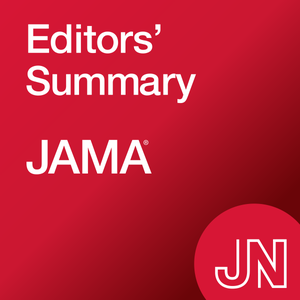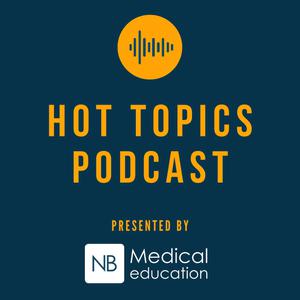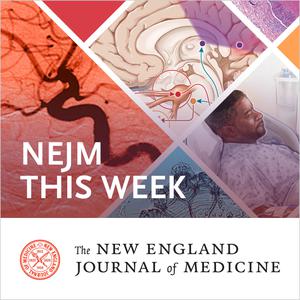
The BMJ Podcast
BMJ Group
The BMJ Podcast: The latest in medicine, brough to you by one of the world’s leading medical journals
- 36 minutes 51 secondsFixing healthcare's workforce problems
Where next for psychological safety? Amy Edmundson is professor of Leadership and Management at the Harvard Business School. Her work on psychological safety has underpinned so much quality improvement, and she joins us fresh of the stage at the International Forum on Quality and safety in healthcare to talk about the next steps in creating a safe work place.
The BMJ has published two new investigations, looking at the alcohol and tobacco industry funding of public health and education - we’ll hear how the companies who create the problems, are now styling themselves as the solution. Rebecca Coombes joins us to explain what The BMJ has found, and May van Schalkwyk, a researcher from the London School of Hygiene & Tropical Medicine, explains how commercial conflicts are shaping the wrong education tactics.
And finally, our NHS commissioners have more recommendations - this time on workforce issues. Mary Dixon-Woods, director of THIS institute at the University of Cambridge, and Matt Morgan, intensive care consultant in Cardiff, tell the NHS to get serious about staffing.
02:03 Amy Edmondson on Future Health and Psychological Safety
10:24 The Impact of Corporate Funding on Public Health
19:57 Addressing NHS Workforce Challenges: Insights and Solutions
Reading list;
Our new podcast - Future Health
International forum keynote - Medscape caves in on courses funded by tobacco giant Philip Morris, while medics fear global push into medical education
Investigation - Big alcohol: Universities and schools urged to throw out industry-funded public health adviceCommission on the future of the NHS - The future of the NHS depends on its workforce
26 April 2024, 5:23 pm - 37 minutes 34 secondsImproving NHS gender identity services - Hilary Cass
Hilary Cass, the former president of the Royal College of Paediatrics, has spent the last 3 years collating the evidence for treatment of gender questioning young people; engaging with those young people, their families and their clinicians - all with the aim of improving NHS treatment of this complex and vulnerable group.
In this interview, Kamran Abbasi, editor in chief of The BMJ, speaks in depth to Cass about her review - about evidence base for transitioning, but also about the way in which the siloing of care for young trans people has failed them.
They discuss the need to support young people in their journey - Cass is clear that the NHS should allow young people to explore their gender, but that ultimately, that may not mean medical intervention at all.
Reading list
The Cass Review - final report
The systematic review and meta-analyses published in Archives of Disease in Childhood
BMJ Opinion: Gender medicine for children and young people is built on shaky foundations
12 April 2024, 3:53 pm - 29 minutes 47 secondsDerogation, an ultra processed food system, and catch up pay for the NHS
Derogation, the way in which striking doctors can be recalled to the ward to protect patient safety, was agreed by NHS England and the BMA. Now, new data The BMJ has uncovered shows that the mechanism was rarely used - and when it was tried, was often rejected. Gareth Iacobucci explains what that means about relations between the government, the NHS, and doctors.
Felice Jacka, director of the Food & Mood Centre at Deakin University, is one of the authors of our recent ultra-processed foods umbrella review - and joins the podcast to talk about the link between diet and health; and why goverments need to pay more attention to the food system.
Finally, John Appleby, senior associate at the Nuffield Trust, and Gillian Leng, dean and president elect of the Royal Society of medicine, have been thinking about healthcare funding, and how more stability is essential in securing the service's future.
Reading list
Ultra-processed food exposure and adverse health outcomes
NHS funding for a secure future
Chapters
00:31 Derogation and doctor strikes 06:59 Ultra processed food producers and health 13:59 Rethinking NHS funding29 March 2024, 7:00 pm - 36 minutes 52 secondsThe future of the clinical relationship, code sharing, and a Nye-t at the theatreIn this week's podcast: How AI will affect the clinician-patient relationship? Our annual Nuffield Summit roundtable asks how the promise of tech tools stacks up against reality, and how the future of the therapeutic relationship can be protected (participants below). Your code is as important as your methods, which is why The BMJ now requires you to share it - Ben Goldacre and Nick De Vito, from the Bennett Institute for Applied Data Science at the University of Oxford, explain why it's so important, and how The BMJ's new data and code sharing policy could change research transparency. Nye Bevin set up the NHS when the UK was in the economic doldrums, and the public's need for care was becoming an emergency - BMJ columnist Matt Morgan has helped turn that story into a play, currently showing at the National Theatre; and reflects on the parallels between now and then. 1:58 Nuffield Summit roundtable 17:32 New BMJ rules on data and code sharing 29:03 Aneurin "Nye" Bevan play Taking part in our roundtable were:
-
Rebecca Rosen, Senior Fellow at the Nuffield Trust and GP
-
Juliet Bouverie, CEO of The Stroke Association
-
Daniel Elkeles, CEO of London Ambulance Service
- Neil Sebire, Professor and Chief Research Information Officer at Great Ormond Street Hospital
How is technology changing clinician-patient relationships?
Mandatory data and code sharing for research published by The BMJ
15 March 2024, 5:59 pm -
- 38 minutes 41 secondsRetracting abortion papers, deafness in the clinic, and 70 years of a medical orchestra
The U.S. Supreme Court is hearing a case on the approval of mifepristone for medical abortion - a case which could change the availability of the drug in the US, and which hinges on papers linking abortion to mental distress. However, those papers are contested (including a paper published by BMJ), and some have been retracted already - Julia Littell and Antonia Biggs tell us how that science is being used in court, and why retraction is essential.
Awakening from anaesthetic is difficult enough, but imagine you're three and only communicate through sign language - which no one can understand. We hear from Kirsten, a mother who thinks everyone should learn at least a few key sign language phrases.
Finally, the London Medical Orchestra is turning 70 - having had their start in The BMJ's letters pages. Stuart Delve and Peter Gough help explain the orchestra's longevity.
01:00 The Supreme Court Case on Medical Abortion
10:27 The Role of Journal Editors in Scientific Integrity
19:54 The Impact of Deafness on Patient Experience
30:57 The Joy of Music in a Medical Career: London Medical Orchestra
References
Analysis: Correcting the scientific record on abortion and mental health outcomes
WYPIT: The importance of British Sign Language
London Medical Orchestra's 70th anniversary concert - 6:30pm, Sun, 10 Mar 2024
1 March 2024, 8:23 pm - 34 minutes 40 secondsHeidi Larson on misinformation, the right exercise to reduce depression, and Breathtaking TV
Social media, and the rate at which the online world is changing, is worrying - especially the speed at which health disinformation can speed around the globe. We look to tech companies for a solution to the problems of their own making - but Heidi Larson, director of the Vaccine Confidence Project, and professor of anthropology, risk and decision science at LSHTM, joins us to explain why we should be cautious about focussing our attention there.
Next on the podcast, research just published in The BMJ looks at the efficacy of exercise at controlling depressive symptoms - but helps finally answer the key question - which exercise works best. Lead author, Michael Noetel, senior lecturer in psychology at the University of Queensland, joins us to explain the research, and how well exercise stacks up against pharmacological treatments.
Finally, while it’s tempting to try and put the pandemic behind us, its effects linger - and many healthcare staff are still dealing with their experience of that time. Rachel Clarke, a palliative care doctor in the UK, joins us to explain why she has felt the need to document the pandemic, first in a book and now in a new TV drama set to air in the UK next week.
06:15 Heidi Larson on vaccine confidence and social media
15:31 Exploring the effectiveness of exercise for depression
26:56 Rachel Clark on seeing her experiences reflected on screen
Reading list
BMJ Collection: How are social media influencing vaccination
Feature: Medical misinformation on social media—are the platforms equipped to be the judge?
Research: Effect of exercise for depression
16 February 2024, 5:46 pm - 39 minutes 46 secondsA health and care emergency, the US constitutional weakness for pandemic response, ActionAid in conflict zones
With a new logo, and new music, comes a revamped The BMJ Podcast.
Every two weeks we’ll be bringing you a magazine style show, more variety and perspectives on medicine, health, and wellbeing.
In this episode:
- Former chief executive of the NHS, Nigel Crisp, explaining why the UK is facing a national health and care emergency (01:22)
- The guest editors of our US covid series, Gavin Yamey and Ana Diez Roux, discuss the US pandemic response, and how problems are built into the US constitution (19:48)
- How The BMJ’s ActionAid appeal will help people in Gaza, Syria and Somalia (33:06)
2 February 2024, 5:59 pm - 33 minutes 34 secondsChristmas 2023 - performing medicine, and prescribing nature
In this festive edition of the BMJ podcast, we hear about what medicine can learn from music, when it comes to giving a convincing performance, and how we can grow an evidence base for nature prescribing.
Professors Roger Kneebone and Aaron William of the Centre for Performance Science raise the curtain on the performance of medicine, and we hear what your consultation technique could learn from a hairstylist.
Ruth Garside, Professor of Evidence Synthesis, Kerryn Husk, Associate Professor of Health Sciences and Edward Chapman from the Health and Environment Public Engagement Group then discuss 'nature prescribing', and wonder about how to balance maintaining the joy derived from nature and yet create an evidence base for the medicinal benefits associated with it.
Reading list
00:13 Introduction to the BMJ Podcast
00:36 Exploring the Themes of the Christmas Edition
01:38 The Intersection of Medicine and Performance
02:33 The Art and Science of Performance in Medicine
05:04 The Role of Performance in Music
06:29 The Similarities Between Medicine and Music
08:06 The Role of Experiential Learning in Performance
14:11 The Impact of Audience on Performance
19:04 The Benefits of Nature and Green Prescribing
24:52 The Challenges of Measuring the Impact of Nature Prescribing
30:37 The Community's Engagement with Nature Prescribing
33:01 Conclusion and Farewell22 December 2023, 7:11 pm - 39 minutes 34 secondsOxytocin, clinical outcomes, and patient choice, in resource constrained settings
There’s an inherent tension between creating quality standards that are very clinically focussed, and standards which are very patient centred - especially in settings where clinical outcomes can be compromised by basic lack of resources.
The use of oxytocin to prevent bleeding after birth is an example of this - WHO quality guidelines clearly measure and incentivise use of the drug, but in more wealthy healthcare systems, adherence patient preference is the key measure.
How can we ensure that less wealthy healthcare systems are also patient centred?
Our guests for this discussion;
Nana Twum-Danso, senior vice president, Institute for Healthcare Improvement (IHI)
Paul Dsane-Aidoo, health specialist, UNICEF Ghana
Keith Cloete, head of department at Western Cape Government: Health
Hosted by Emma Veitch, Collections editor for The BMJ
This podcast is part of The BMJ Quality of Care collection, in collaboration with the World Health Organization and the World Bank, which offers critical thinking on both the unfinished agenda and emerging priorities for improving quality of care in low- and middle-income countries.
00:00 Introduction to the podcast
00:48 Introduction of experts and their backgrounds
02:54 Challenges in healthcare systems: south africa's perspective
04:15 The importance of patient-centred care
04:56 The role of data in improving quality of care
06:11 Community engagement and feedback in healthcare
07:58 Tackling global disparities in healthcare
08:41 Balancing clinical outcomes and patient-centred care
10:58 Addressing inequities in healthcare
22:43 The role of governance in improving quality of care
32:56 Overcoming resource constraints in healthcare
36:22 The need for system redesign in healthcare
37:18 Adapting to changing times in healthcare
21 December 2023, 5:35 pm - 48 minutes 7 secondsSocial connection is essential for health; supporting adolescent health and wellbeing
In this specially curated three-part podcast series from The BMJ, we explore the importance of community and connection to foster adolescent wellbeing.
The discussion covers athe wide array of issues young people face, with a particular focus on the unique challenges of adolescence from a social perspective. The episode unpacks the significance of having supportive relationships within families, schools, and communities and the influence of these relationships on the mental and behavioural health outcomes of adolescents.
It also explores the impact of digitalization on adolescent connection, with discussions on how to balance online interactions with offline engagements. Importantly, it highlights the need for further research into understanding digital and social media interactions and their influence on the health and wellbeing of adolescents in a rapidly evolving digital landscape.
Our guests:
Ulises Ariel Vélez Gauna, Transmitiendo Diversidad
Flavia Bustreo, Fondation Botnar
Richard Dzikunu, YIELD Hub
Shelani Palihawadana, Young Experts Tech for Health.
Joanna Lai, United Nations International Children’s Emergency Fund (UNICEFUnicef)
Hosted by Adam Levy
Supported by the Fondation Botnar and PMNCH, the Partnership for Maternal, Newborn, and Child Health. Read the full cCollection of articles showing the importance of investing in adolescent wellbeing.
00:04 Introduction to the podcast series
00:36 Understanding adolescence from a social perspective
01:00 The impact of community and connection on adolescents
01:07 Personal experiences: growing up as an LGBT+ teenager
01:38 The role of supportive relationships in adolescents' lives
02:05 The importance of connectedness in adolescence and beyond
03:27 Treating safe spaces for LGBT+ adolescents
05:23 The unique role of community during adolescence
07:02 The impact of political landscape on LGBT+ community
07:54 The importance of community and connectedness: expert opinions
08:56 The interconnection of social, health, and educational well-being
12:14 The role of digital technology in adolescents' lives
16:56 The importance of investing in adolescents' well-being
43:18 The role of schools in fostering connectedness
45:41 Conclusion: personal reflections on connectedness
14 December 2023, 9:18 pm - 45 minutes 29 secondsGive children control; supporting adolescent health and wellbeing
This is the second episode of a special three-part podcast series that delves into adolescent health and wellbeing, focusing on creating a positive trajectory of health from a young age.
The podcast explores physical and mental health issues affecting young people globally, particularly in sexual and reproductive health. We hear how young people are excluded from decisions about their own health, and how grassroots groups around the world are empowering them to take responsibility for their own wellbeing.
We also hear how young people are becoming leaders in social movements, from tackling structural racism to improving nutrition in schools, and how their unique perspectives are vital in making those changes.
Our guests:
Natasha Salifyanji Kaoma, Copper Rose Zambia
Alaa Murabit, The Bill and Melinda Gates Foundation
Donald Bundy, London School of Hygiene and Tropical Medicine
Anshu Banerjee, World Health Organisation
Dev Sharma, Bite Back 2030
Hosted by Adam Levy
Supported by the Fondation Botnar and PMNCH, the Partnership for Maternal, Newborn, and Child Health. Read the full cCollection of articles showing the importance of investing in adolescent wellbeing.
00:05 Introduction to adolescent health
01:00 Young womens’ menstrual health
02:11 Discussion on candid pride project
03:29 Importance of sexual and reproductive health
04:49 The role of young people in health advocacy
06:17 The epidemiology of early health and lifecourse
10:08 Impact of adolescent health on future generations
18:29 How young people become activists
28:51 Advocacy for women in Libya
28:54 Global forum for adolescents
40:15 Success stories
44:54 Conclusion and preview of next episode
14 December 2023, 9:18 pm - More Episodes? Get the App
Your feedback is valuable to us. Should you encounter any bugs, glitches, lack of functionality or other problems, please email us on [email protected] or join Moon.FM Telegram Group where you can talk directly to the dev team who are happy to answer any queries.
 BMJ Best Practice Podcast
BMJ Best Practice Podcast
 JAMA Editors' Summary
JAMA Editors' Summary
 Primary Care Knowledge Boost
Primary Care Knowledge Boost
 GPnotebook Podcast
GPnotebook Podcast
 NB Hot Topics Podcast
NB Hot Topics Podcast
 NEJM This Week
NEJM This Week